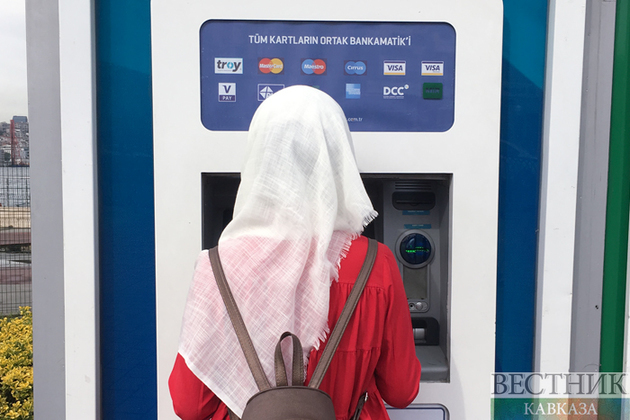Banks and big companies have benefited from Ankara’s controversial policy to keep interest rates low, while soaring inflation eats into the real income of the wage-earning masses.
Al-Monitor writes that Turkey’s galloping inflation, on course to top 100% in the fall, has been causing daunting income transfers from the poor to the rich, worsening further the income distribution gap in the country, economic data show. Annual consumer inflation, which stood at less than 20% in September 2021, skyrocketed in six months to reach 61.1% in March. The sharp uptick has rendered pay rises in the beginning of 2022 irrelevant, stoking real income losses. Along with wage- and salary-earners, agricultural producers, too, have taken severe blows from inflation, with the gap between agricultural product prices and industrial prices growing to the detriment of farmers.
Banks and big companies, meanwhile, have cashed in on Ankara’s controversial policy to keep interest rates low despite soaring prices. Against consumer inflation of 61.1%, the central bank’s policy rate stands at 14%, unchanged since December, which has benefited banks and corporate loan users, as evidenced by profit statements made to the stock exchange.
Turkey’s chronic income inequalities, which had already worsened in 2021, appear on course to reach staggering levels this year. Economic growth data by the Turkish Statistical Institute show that payments to employees last year dropped to 30.2% of gross value added from 33.1% in 2020, while the share of net operating surplus/mixed income, earned by employers, rose to 52.6% from 49.3% in the same period. This is a clear indication of income transfer.
Economic data from the first quarter of 2022 show that the inequalities have deepened amid the high inflationary environment that is fast eroding the purchasing power of the minimum wage, public-sector salaries and pensions. According to trade unions, the monthly cost of a healthy and balanced diet rose to nearly 6,000 Turkish liras ($410) for a family of four in March, soaring well above the minimum wage.
President Recep Tayyip Erdogan announced a 50.5% rise of the minimum wage at the turn of the year, bringing it to 4,253 liras ($290) from 2,825 liras in 2021. Employment in Turkey stood roughly at 29 million at the turn of the year. About 20 million of those people earn monthly salaries or daily wages, and nearly half of them are paid the minimum wage or slightly higher salaries. In other words, the minimum wage is not just a reference floor but has become the prevalent pay in Turkey.
While the minimum wage is raised once at the turn of the year, public servants and pensioners receive two hikes in January and July. Given that inflation hit 51.4% in the eight months from July 2021 to March, the 50.5% rise of the minimum wage stayed above that inflation rate for two months only — in January and February — and was already 1 percentage point below it in March. The country’s nearly 3 million public servants and 6 million retired workers, who represent the bulk of pensioners, have suffered similar real income losses.
According to data by the presidency’s Strategy and Budget Directorate, the pensions of retired workers averaged 2,599 liras in July 2021. After a 25% hike in January, the average pension rose to 3,252 liras ($222). It was meant as a six-month adjustment to inflation, but given the 51.4% consumer inflation in the eight months to March, those pensioners suffered significant income loss in real terms despite the rise.
As for public servants, their monthly salaries averaged 5,057 liras in July 2021. That sum reached 6,674 liras ($455) after a 32% increase in January, but public servants have seen their pay rise fall behind inflation since February and will have to put up with significant real income losses until July, when the next hike will be announced.
Farmers are another group suffering real income losses from inflation, with the prices of agricultural producers falling well behind those of industrial producers. As of March, agricultural producers increased their prices by 84% year-on-year, while the prices of industrialists were up by 115%, which indicates an income transfer from agriculture to the industry. While a significant part of the populace grapples with melting real incomes, banks and big corporations have been able to increase theirs.
Data by the Banking Regulation and Supervision Agency show that banks made net period profits of 39 billion liras in the first two months of the year, a 323% increase from 9.2 billion liras in the same period in 2021. Similarly, the ratio of net period profits to shareholder equity rose to 5.22% in the first two months, up from 1.52% in the same period in 2021. In annual terms, return on equity rose to 31.32% from 9.12%.
While the central bank’s policy rate stands at 14%, the banks have offered yields of 16-17% to lira deposits and issued loans with interest rates of over 25%. Under a government-backed scheme to safeguard lira deposits against any slump of the currency, the interest rates that banks pay on deposits have been limited to 17%, which has helped banks to obtain liras at a relatively low cost. Banks have increased their revenues also by lending to the Treasury with annual interest rates of some 25%. The banks’ interest revenues from securities totaled 41.4 billion liras in the first two months of the year, up from 15.6 billion liras in the same period in 2021.
Big companies appear to be thriving as well. According to stock exchange data compiled by the official Anatolia news agency, the profits of real estate investment companies listed on the stock exchange increased nearly seven times in 2021, as did the profits of companies in the chemicals, petroleum and plastics sectors. Companies in the electricity sector increased their profits six times, and those in the metal and basic industry sector 4.5 times.






